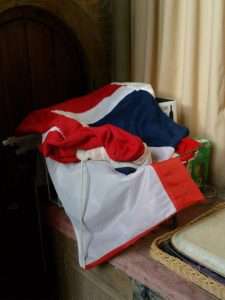From the same perspective
A seafaring friend is about to be transferred from one port to another, from Newhaven in Sussex, he is being moved to Wick in Scotland. As an old friend, Duncan, would have commented, “that’s truly north.”
A softly spoken Scot with a dry sense of humour, he could enliven meetings with sotto voce comments. Sitting at a broadcasting conference in the early-1990s, a speaker introduced themselves as from BBC North. “North?” said Duncan, “does he mean Wick?” It was not the fault of the speaker that the BBC labelled an area in northern England as “North.” A friend from Cumbria raises similar objections to Liverpool being regarded as “north-west England.” He would point out that from the perspective of someone in Penrith, Merseyside is in the midlands.
Duncan would have enjoyed conversation with a woman I knew in Northern Ireland who came from Cumbrae in the Firth of Clyde. Blessed with a wonderful sense of humour, she would tell a story of the minister on Great Cumbrae who would stand in the kirk on the Sabbath and pray for the islands of Great and Little Cumbrae and for the offshore nations of Scotland and England. It was a perspective that was both humorous and thought-provoking.
In Ireland, labels used for the two constitutional jurisdictions often reflected political views more than geographical perspective. To call Northern Ireland “Ulster,” as was the custom of unionist politicians, was a geographical and historical misnomer, but so then was the practice in the Republic of Ireland of referring to Northern Ireland as “the North.” Donegal, Cavan and Monaghan contradicted both labels.
However, despite Duncan’s objections, there is a logic in a geographical labels being applied according to one’s perspective, the speaker from BBC North did come from a region far north of the BBC headquarters in London. Where things become illogical is when two people standing in the same place look at the same thing and define it in contradictory ways.
The Brexit debate has become one where politicians who formerly shared a single view now look at the same institutions and describe them in terms that are diametrically opposed. It is not that they are standing in different places, some of the discussion has become analogous to two people standing in the one place and staring in the same direction and one calling it north and the other calling it south. When not engaged in propagating opposing definitions for the same things, the protagonists resort to ad hominem attacks. Sometimes, the prayers of the minister of Cumbrae seem a model of rational thought. Sometimes, someone with the perspicacity of Duncan might be desirable in order to set out the points of the compass of the increasingly acrimonious debate.



Position, a bit like time, is very dependent on the observer. In fact both form the cul-de-sac the theoretical sciences have locked themselves in for the last 90 years.
You’ll have noticed English people say ‘up to town’ meaning going to London. But Irish people NEVER say that about Dublin. But Dubliners always say ‘down the country’ regardless if they were heading to Kippure. Where I live we have ‘up the road’, ‘over the road’, ‘in the road’ and ‘down the road’. And as odd as it seems from Kilkenny, Rathdowney is up the road, Carlow over the road, from the Hebron Rd Rose Inn St is in the road and Waterford down the road. Of course the insanity arrives when two people are from different places and both are deploying their own.
I remember the James Herriot books where when he arrived in the Dales the people used something akin to it confusing the hell out of him.
I must get them again. Tiz years since I read them.
“Up to town” is probably much more a Home Counties thing, where commuting is a daily reality. I remember thinking that Somerset had connected with London when I first saw “Time Out” magazine in WH Smith in Taunton in the 1970s.